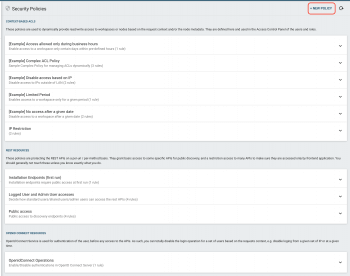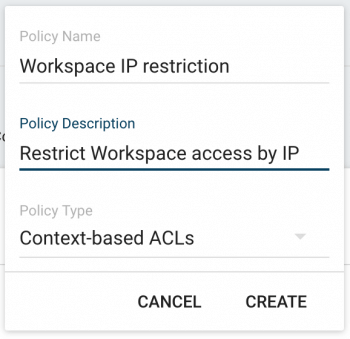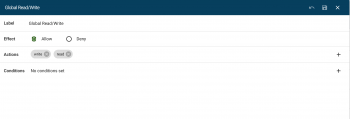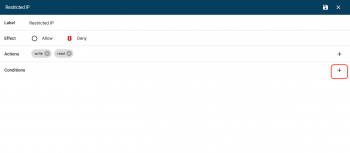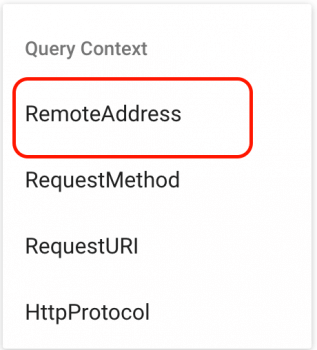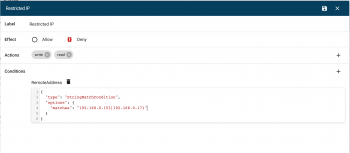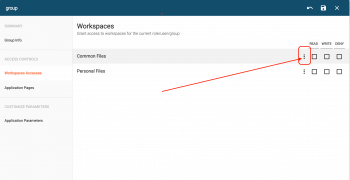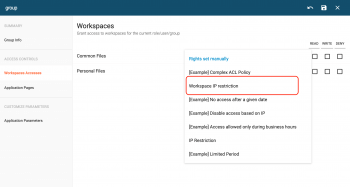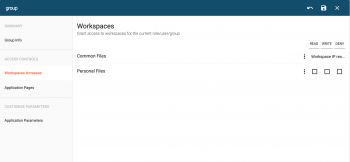ACL use cases
Created on 2023/03/06,This chapter presents some real-life use cases of the ACL feature. At the bottom of the page, you can find a more complete glossary.
For a deeper understanding on how Security Policy work you might also refer to the corresponding section of our administration guide.
IP Restrictions
Deny Access on a workspace to a list of IP
This is an example on how to deny access to a given workspace for a list of specific IPs.
You can also apply this rule to Cells, Share links and so on.
- Create a New Policy (Policy Type:
Context-based ACLs. Put the Name and Description of your choice)
- Then define default permissions: they are mandatory otherwise other users will not have access. So we give read/write to everyone before adding a restriction based on IPs for specific requests.
- Now, let's add a policy to define the IP restriction rule:
- Give it a Label, Effect:
Deny, Actions:Read/Write, as seen in screenshot 5:
- Add a condition and choose
RemoteAddress:
- Write the condition, using JSON: in our example we explicitly define some IPs.
Save
We can now apply the newly created rule. In our example, we apply it on a group. But you can also choose user, group, role, etc.
- Select the rule, using the label you have defined earlier
- Once the rule is selected, save the changes:
Allow access for a specific IP range
You could also do the opposite and only give access to a list of IP by using StringNotMatchCondition.
IMPORTANT: Security policies, as provided by Pydio Cells, are both "Deny By Default" and "First Deny Wins". It means that, when no policy is defined, the resources are not available. It also means that if we have 2 rules that are applied to the same resource for the same subject, if one gives access and the other forbids it, the resource is not available.
Thus to allow access, you only have to define one rule that explicitely gives the access for the required IP range:
- Create a New Policy (Policy Type:
Context-based ACLs) - Create a rule that allows access to specific IP addresses or a range.
Corresponding JSON can then be something like:
{
"type": "StringMatchCondition",
"options": {
"matches": "192.168.2.*"
}
}
Note that you can also add multiple string conditions by separating them with a pipe | character. For instance:
192.168.0.*|192.168.3.2|...
ACLs values
Actions
| Action | Effect | Example |
|---|---|---|
| Read | read a resource | e.g. with a workspace, it means that the workspace is displayed in the various lists and browsable |
| Write | write a resource | e.g. with a workspace, you can upload new or modify existing resources |
Query Context
| Query | Effect | Description |
|---|---|---|
| Remote Address | The client's remote address | Remote IP presented by the request that accesses a resource |
| Request Method | REST Methods | The type of the current REST method (PUT, GET, DELETE, etc.) |
| Request URI | A Pydio Cell's endpoint | The path part of the URL, to restrict current rule to a subset of end-points |
| HTTP Protocol | Protocol used by current request: mainly HTTP or HTTPS | |
| UserAgent | Type of the client agent | Such as browsers, mobile apps, etc. |
Conditions
| Type | Options | Example | Description |
|---|---|---|---|
| StringMatchCondition | "matches |
"matches": "192.168.0.1" |
condition is true if there is a match |
| StringNotMatchCondition | "matches |
"matches": "192.168.2.1" |
condition is true if there is no match |
| DateAfterCondition | "matches" |
"matches": "2018-02-28T23:59+0100" |
condition is true if date is after the one defined in the match |
| WithinPeriodCondition | "matches" |
"matches": "2018-02-01T00:00+0100/2018-04-01T00:00+0100" |
condition is true if date is within the range of match |
| OfficeHoursCondition | "matches" |
"matches": "Monday-Friday/09:00/18:30" |
condition is true if date & time are within the match |
Note: under the hood, Cells uses we internally use LADON, you might find it useful to refer to their documentation, typically on conditions to gain a deeper understanding of what you can do and how.
